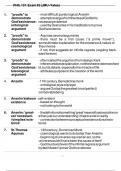PHIL 101:Exam #2 (JMU -Yates)
,e ,e ,e ,e ,e ,e
1. "proofs" to ,e - most difficult;purely logical;Anselm ,e ,e ,e ,e
demonstrate
,e - attempts to argue from the idea of God to his ,e ,e ,e ,e ,e ,e ,e ,e ,e
God'sexistence:
,e ,e ,e necessaryexistence
,e ,e
ontological - used by Descartes in his meditations to prove ,e ,e ,e ,e ,e ,e ,e
argument
,e God'sexistence
,e ,e
2. "proofs" to ,e - Aquinas;several arguments ,e ,e
demonstrate
,e - there must be a first cause ("a prime mover"), ,e ,e ,e ,e ,e ,e ,e ,e
God'sexistence:
,e ,e ,e someultimate explanation for the existence & nature of
,e ,e ,e ,e ,e ,e ,e ,e ,e
cosmological theuniverse
,e ,e
argument
,e - if not, that suggests an infinite regress (arguing back-
,e ,e ,e ,e ,e ,e ,e ,e
ward forever)
,e ,e
3. "proofs" to ,e - often called the argument from design;Kant ,e ,e ,e ,e ,e ,e
demonstrate
,e - inferencetobestexplanation,notthesheerexistenceofwor ,e ,e ,e ,e ,e ,e ,e ,e ,e
God'sexistence:
,e ,e ,e ld, but its details, especially the miracle of life
,e ,e ,e ,e ,e ,e ,e ,e
teleological - attributes purpose to the creation of the world ,e ,e ,e ,e ,e ,e ,e
argument
,e
4. Anselm - 11th century, Benedictine monk
,e ,e ,e ,e
- ontological;style of prayer ,e ,e ,e
- argues God as the greatest (most perfect) ,e ,e ,e ,e ,e ,e
conceivablebeing
,e ,e
5. Anselm'stakeon - self-evident ,e ,e ,e ,e
existence - based on thought ,e ,e
- not looking to the world ,e ,e ,e ,e
6. Anselm: 'great- ,e - thedefinitionofsomething'great'meansithastoexistinmor
,e ,e ,e ,e ,e ,e ,e ,e ,e ,e ,e
est' necessari-
,e ,e e than just our understanding;it has to exist in reality
,e ,e ,e ,e ,e ,e ,e ,e ,e ,e
lyimplies 'exis-
,e ,e ,e - connection between conceptual existence & real exis- ,e ,e ,e ,e ,e ,e
tence'
,e tence
,e
7. St.Thomas ,e ,e - 13th century, Dominican Monk ,e ,e ,e
Aquinas - cosmological;wants to do better than Anselm ,e ,e ,e ,e ,e ,e
- beginning of universe required an act, so the ,e ,e ,e ,e ,e ,e ,e
universecouldn't have been the cause of itself
,e ,e ,e ,e ,e ,e ,e ,e
- God must exist even if the infinite regress argument
,e ,e ,e ,e ,e ,e ,e ,e
byitself doesn't prove God's existence
,e ,e ,e ,e ,e ,e
,e ,e
, PHIL 101:Exam #2 (JMU -Yates)
,e ,e ,e ,e ,e ,e
8. Immanuel Kant ,e - ontological proof doesn't work b/c it can't go from the
,e ,e ,e ,e ,e ,e ,e ,e ,e ,e
concept/idea of God to existence of god ,e ,e ,e ,e ,e ,e
- can't prove God's existence logically;would have to bea
,e ,e ,e ,e ,e ,e ,e ,e ,e
matter of faith
,e ,e ,e
9. Aquinas:the ,e 1. motion/change (potentiality to actuality) ,e ,e ,e
fiveways
,e ,e 2. nature of efficient cause (something must cause all ,e ,e ,e ,e ,e ,e ,e
(echoes of
,e ,e thethings that cause other things)
,e ,e ,e ,e ,e ,e
Aristotle)
,e 3. possibility&necessity(everythingthatexistsmusthavepo ,e ,e ,e ,e ,e ,e ,e ,e
ssibly existed) ,e
4. gradation (levels) found in things (some things in the ,e ,e ,e ,e ,e ,e ,e ,e
worldaremore/lessgoodthanothers;impliesareferencepoi
,e ,e ,e ,e ,e ,e ,e ,e ,e ,e
nt)
5. governance of the world ('intelligent design';teleologi- ,e ,e ,e ,e ,e ,e
cal;God as intelligent governor)
,e ,e ,e ,e ,e
10. telos natural things act for an end goal (Aristotle - final cause)
,e ,e ,e ,e ,e ,e ,e ,e ,e ,e
11. scholasticism posing two counter viewpoints that are common, then
,e ,e ,e ,e ,e ,e ,e
give opinions ,e
12. who is a ,e ,e
radicalempirici
,e ,e
16. Pascal'sWager ,e
st?
13. Hume's take ,e
onGod
,e ,e
14. who merges the ,e ,e
conceptofgod&t
,e ,e ,e ,e ,e
he existence of
,e ,e
god?
,e
15. who
separates the
,e ,e
concept of god
,e ,e ,e
& the exis-
,e ,e ,e
tence of god?
,e ,e ,e
,e ,e
, PHIL 101:Exam #2 (JMU -Yates)
,e ,e ,e ,e ,e ,e
David Hume ,e
- the world seems poorly ,e ,e ,e
designed:imperfect
,e ,e
God? ,e
- evil, pain, ,e
uncertainty: God is still
,e ,e ,e ,e
working on it?
,e ,e ,e
- we can't just infer ,e ,e ,e
that God exists, as
,e ,e ,e ,e
far as reason
,e ,e ,e
isconcerned
,e ,e
Anselm
Kant
,e ,e




